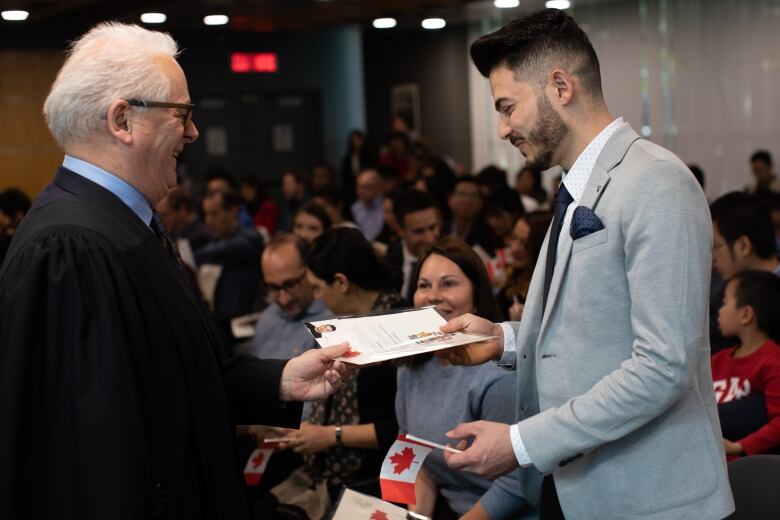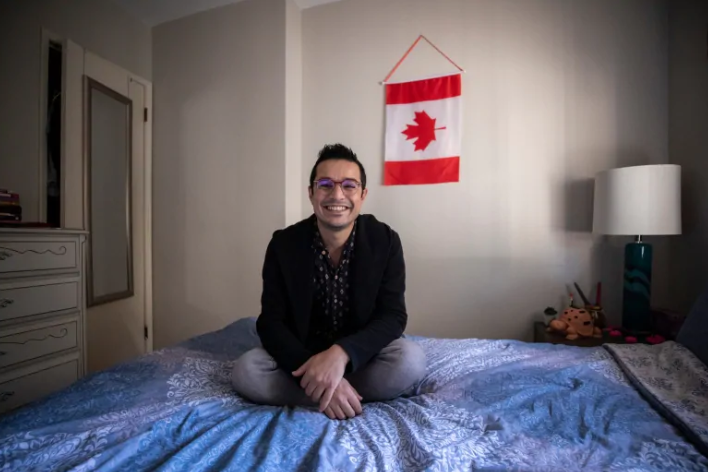First-time voters study parties' positions before casting ballots in an advance poll

Mohammed Alsaleh can remember the exact moment he says his life changed.
He was working in a car shop — one of the few jobs the former medical student could find in Lebanon as a refugee from war-torn Syria — when he got a call from the Canadian Embassy. And the voice on the other end said his application has been accepted.
"I felt so happy. We have this saying in Arabic: 'The world wasn't enough for me.' I felt so incredibly happy."
Aside from recognizing Canada's distinctive maple leaf flag, Alsaleh said he knew absolutely nothing about his new home.
And so he Googled everything he could — and arrived in Vancouver in September 2014.
He was part of the first wave of Syrian refugees who arrived under the former Conservative government.
Five years later, Alsaleh is a Canadian citizen, and once again, he has searched all he could — this time about the political parties' platforms.

He voted at the first opportunity in the advance polls in his riding of Burnaby South on Friday at 9 a.m. sharp.
"This is amazing. Democracy is awesome, and it's so empowering," he said coming out of the polling station, giddy with excitement.
According to Citizenship Canada, 44,599 Syrian refugees have arrived in Canada since Nov. 4, 2015.
As of August 2019, approximately 13,790 have applied for citizenship but only 606 have become Canadian citizens. It's unclear how many of those 606 are over 18 and can vote.
Some, like Bashar Al Asad, are undecided which candidate to support.
He became a Canadian citizen on Oct. 10 — mere days before the federal election. His leg tapped nervously as he took his citizenship oath, holding a Canadian flag.

He plans to follow the advice of the presiding judge who reminded everyone at the citizenship ceremony that an election was coming up, and to vote on Oct. 21.
Al Asad is part of the wave of refugees who were welcomed to Canada by the Liberal government. In the 2015 federal election, a key Liberal campaign promise was to double the number of Syrian refugees, after images of toddler Alan Kurdi's body washed up on a beach shook consciences globally.
But Al Asad says that's not an immediate vote for Justin Trudeau's Liberals as far as he is concerned.
"Economy, and honestly, environment" he says are more important issues.
Danny Ramadan was so curious about free elections that he followed his boyfriend to the 2017 British Columbia election just to see how it was done even though he wasn't eligible to vote.
"I just stood there being envious a bit … like, I want to be part of this … but it's also something I want to practise for the rest of my life. I don't think I will ever miss an election."

In this federal election, Ramadan voted NDP in Vancouver Centre, a riding that has been a Liberal stronghold. He says every vote does count.
"It was my first time voting and it was really important for me to vote with my morals," he said.
Trudeau's blackface photos also weren't a deciding factor for him.
"Honestly, it was disappointing but I'm not going to judge him for something that happened almost 20 years ago," he said.
"For me, the deciding factor was the debate."
Alsaleh researched the parties' positions on climate change, housing and immigration before casting his vote in Burnaby South for NDP Leader Jagmeet Singh.
"As a former refugee, Canada's immigration policy is something that saved my life and something that saved my family's life," he said.
Hard to understand voter apathy
But all three men reiterated the most important thing they could do was vote — and they encouraged others to do the same.
As a child, Alsaleh worked at a polling station in Syria preparing election cards.
"It asked a question: 'Do you want Mr. Assad to be the president?' My job was to mark yes, so when Syrians come to vote … it's already marked yes," he said. "That's Syrian democracy."
And compared to his Canadian ballot?
"For the first time, I see a ballot with different choices and I get to vote secretly and then cast my own vote into the ballot — it's amazing."
He finds it hard to comprehend that many Canadians do not cast their votes — Elections Canada says the turnout was 66 per cent in 2015.
"People are dying to have a say in my country, Syria," Alsaleh said. "And here you can do it without being policed, without being harassed. You shouldn't take it for granted. You should go out there, you should vote. Do your duty as a citizen."
Ramadan put it even more simply.
"Check your privilege."























